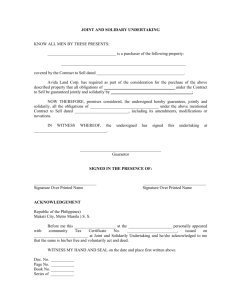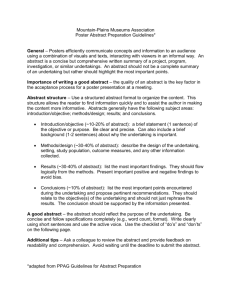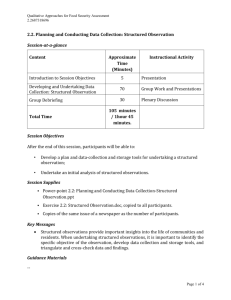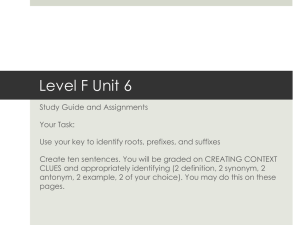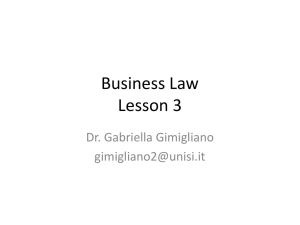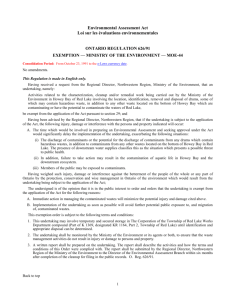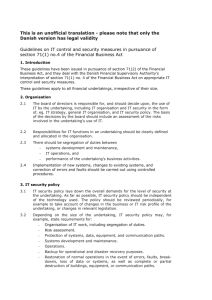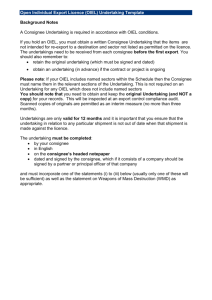FCA 1244 (2 Oct 1998) (DOC 104KB) - Anti
advertisement
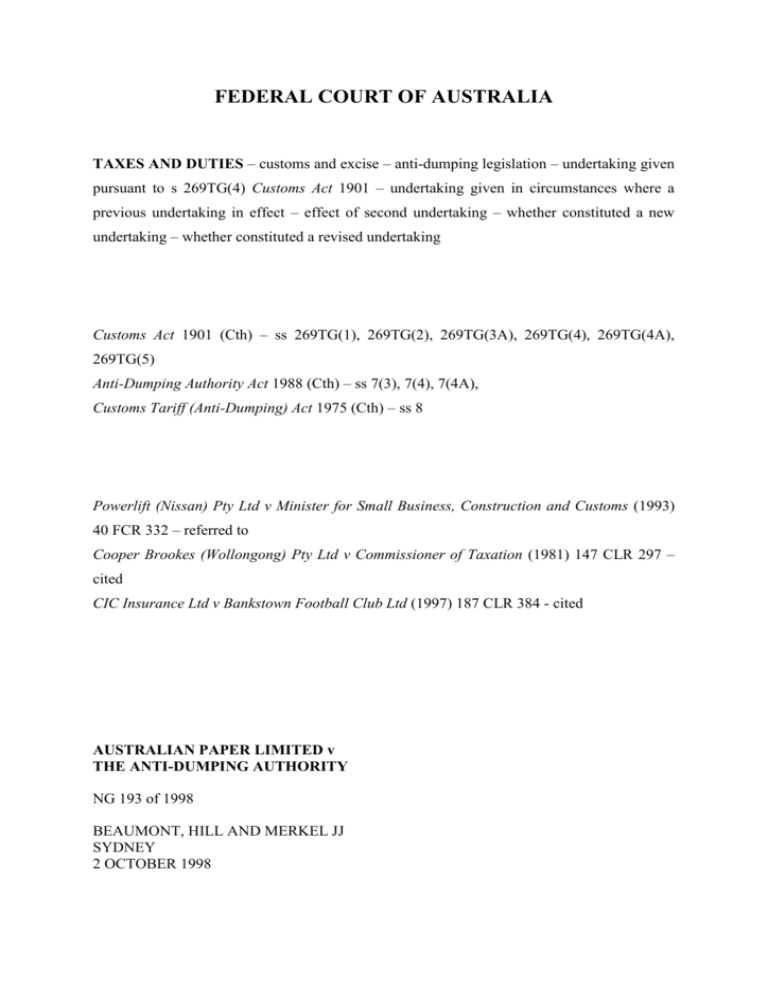
FEDERAL COURT OF AUSTRALIA TAXES AND DUTIES – customs and excise – anti-dumping legislation – undertaking given pursuant to s 269TG(4) Customs Act 1901 – undertaking given in circumstances where a previous undertaking in effect – effect of second undertaking – whether constituted a new undertaking – whether constituted a revised undertaking Customs Act 1901 (Cth) – ss 269TG(1), 269TG(2), 269TG(3A), 269TG(4), 269TG(4A), 269TG(5) Anti-Dumping Authority Act 1988 (Cth) – ss 7(3), 7(4), 7(4A), Customs Tariff (Anti-Dumping) Act 1975 (Cth) – ss 8 Powerlift (Nissan) Pty Ltd v Minister for Small Business, Construction and Customs (1993) 40 FCR 332 – referred to Cooper Brookes (Wollongong) Pty Ltd v Commissioner of Taxation (1981) 147 CLR 297 – cited CIC Insurance Ltd v Bankstown Football Club Ltd (1997) 187 CLR 384 - cited AUSTRALIAN PAPER LIMITED v THE ANTI-DUMPING AUTHORITY NG 193 of 1998 BEAUMONT, HILL AND MERKEL JJ SYDNEY 2 OCTOBER 1998 GENERAL DISTRIBUTION IN THE FEDERAL COURT OF AUSTRALIA NEW SOUTH WALES DISTRICT REGISTRY NG 193 of 1998 ON APPEAL FROM A SINGLE JUDGE OF THE FEDERAL COURT BETWEEN: AUSTRALIAN PAPER LIMITED (ACN 005 146 350) Appellant AND: THE ANTI-DUMPING AUTHORITY Respondent JUDGES: BEAUMONT, HILL AND MERKEL JJ DATE: 2 OCTOBER 1998 PLACE: SYDNEY THE COURT ORDERS THAT: 1. The appeal be allowed. 2. Orders made at first instance be set aside and in lieu thereof it be ordered that the decision of the Respondent to hold an inquiry into whether the Minister for Customs and Consumer Affairs should release P.T. Pabrik Kertas Tjiwi Kimia (“Tjiwi Kimia”) from an undertaking given by Tjiwi Kimia to the Minister on or about 7 July 1997, that future consignments by Tjiwi Kimia to Australia of A4 copy paper would be made at export prices which were not less than those specified in a table included with that undertaking, be set aside. 3. The Respondent pay the costs of the appeal and the proceedings at first instance. Note: Settlement and entry of orders is dealt with in Order 36 of the Federal Court Rules IN THE FEDERAL COURT OF AUSTRALIA NEW SOUTH WALES DISTRICT REGISTRY NG 193 of 1998 ON APPEAL FROM A SINGLE JUDGE OF THE FEDERAL COURT BETWEEN: AUSTRALIAN PAPER LIMITED (ACN 005 146 350) Appellant AND: THE ANTI-DUMPING AUTHORITY Respondent JUDGES: BEAUMONT, HILL AND MERKEL JJ DATE: 2 OCTOBER 1998 PLACE: SYDNEY REASONS FOR JUDGMENT BEAUMONT AND HILL JJ: THE BACKGROUND TO THE APPEAL On 22 January 1994 PT Pabrik Kertas Tjiwi Kimia (“Kimia”) gave an undertaking to the Australian Minister for Science and Small Business under the provisions of s 269TG(4) of the Customs Act 1901 (Cth) (“the Customs Act”) with respect to sales in Australia of A4 copy paper imported into Australia by it from Indonesia. That undertaking, which we will hereafter refer to as “the first undertaking” was accepted by the Minister on 3 February 1994. It bound Kimia during its currency not to sell A4 copy paper below certain specified prices. On or about 7 July 1997 Kimia gave what the Appellant, Australian Paper Limited (“APL”), an Australian producer of A4 copy paper, considered was a new or fresh undertaking in respect of sales in Australia of A4 copy paper, operating prospectively from the date of acceptance which is said to be 30 July 1997. This so-called new or fresh undertaking will hereafter be referred to as “the second undertaking”, although in giving it that name we do –2– not seek, at this stage to pre-empt the issue which arises for decision. It referred to specified prices higher than those in the first undertaking, below which Kimia agreed not to sell A4 copy paper in Australia. On 13 August 1997 the Respondent, the Anti-Dumping Authority (“the Authority”), purporting to act under s 7(3) of the Anti-Dumping Authority Act 1988 (Cth) (“the Authority Act”) gave notice of a revocation enquiry into whether Kimia should be released from the first undertaking. APL then commenced proceedings in this Court relying upon the Administrative Decisions (Judicial Review) Act 1977 (Cth) to review the decision of the Authority to hold the enquiry. It was APL’s case that the only undertaking of Kimia in force was the second undertaking, that less than twelve months had elapsed from the date of acceptance of that second undertaking and that in consequence an enquiry could not be held either into the first undertaking or the second. The argument that no enquiry could be held into the second undertaking relied upon the provisions of s 7(4A) of the Authority Act to which we shall shortly refer. The Authority was of a different view. It regarded there to be but the one undertaking, that is that given in January 1994. It viewed the second undertaking not to be a new or fresh undertaking at all, but in fact a mere variation of the first undertaking which remained in force. As more than 12 months had elapsed from the acceptance of the first undertaking the provisions of s 7(4A) could have no application. Thus the issue which arose for decision before a Judge of the Court was whether what was proffered by Kimia and accepted by the then Minister in July 1997 amounted, as APL submitted, to a new undertaking given by Kimia, which superseded the first undertaking or whether it was but a variation of the first undertaking of Kimia, which remained in force, subject to the variation. The learned primary Judge was of the view that there was only the one undertaking, that being the first undertaking which had been varied. In the result he dismissed the Application. APL now appeals to this Court from his Honour’s judgment. –3– THE FACTUAL CONTEXT There is no dispute about the facts. The following summary is taken largely from the judgment appealed against. On 13 May 1993 APL had lodged an application with the Australian Customs Service (“Customs”) requesting that anti-dumping measures be put in place against exports to Australia of A4 copy paper from a number of countries, including Indonesia. In a preliminary report of 15 September 1993 Customs concluded that A4 copy paper had been exported to Australia at dumped prices, that future exports from Indonesia might be at dumped prices and that material injury had been suffered by the Australian industry producing like goods such that provisional anti-dumping measures should be imposed. On 28 September 1993 Customs referred to the Authority the question whether anti-dumping action was justified in respect of A4 copy paper from countries which included Indonesia. The Authority found that imports of such paper had been dumped, that there could be future imports of such paper at dumped prices and that the Australian industry producing like goods had suffered material injury and that in light of this it was recommended that the Minister accept a certain price undertaking offered by Kimia and suspend consideration of whether a declaration should be made that s 8 of the Customs Tariff (Anti-Dumping) Act 1975 (“the Anti-Dumping Act”) apply to future exports of A4 copy paper by Kimia from Indonesia to Australia. The undertaking (ie. the first undertaking) which was addressed to the Australian Minister for Science and Small Business in a document dated 22 January 1994 was in the following terms: “Subject: Undertaking for the purpose of Section 269TG of the Customs Act 1901 Acknowledging that you are considering whether or not a declaration under section 269TG of the Customs Act 1901 should be made in regard to the exportation to Australia of A4 copy paper from Indonesia, PT Pabrik Kertas Tjiwi Kimia, being the exporter of such goods, hereby undertakes that PT Pabrik Kertas Tjiwi Kimia will conduct its future export trade to Australia in like goods so as to avoid causing or threatening material injury to the Australia [sic] industry producing like goods. –4– For this purpose, future consignments of the goods as are described in the following table (“The Table”) will be made at export prices which are not less than those specified in the table. PT Pabrik Kertas Tjiwi Kimia acknowledges that such export prices may be subject to review from time to time. PT Pabrik Kertas Tjiwi Kimia also acknowledges that this undertaking shall take effect from the date of your acceptance thereof, but will lapse should you decide not to issue a notice declaring that section 8 of the Customs Tariff (Anti-Dumping) Act 1975 applies to like goods exported from Indonesia. THE TABLE DESCRIPTION : Woodfree, uncoated white A4 cut ream copy paper, weighing from 70 to 80 grams per square metre. EXPORT PRICE $ Aus per tonne. FOB Indonesia, packed, cash. No adjustment is to be made to the export price for credit terms up to 90 days.” The dollar figures in the table are confidential, and thus not here reproduced. The first undertaking was accepted by the Minister by an instrument dated 3 February 1994 in the following terms: “ACCEPTANCE OF UNDERTAKING FOR THE PURPOSES OF PARAGRAPH 269TG(4)(b) OF THE ACT I, CHRISTOPHER CLELAND SCHACHT, Minister of State for Science and Small Business hereby ACCEPT the undertaking by PT Pabrik Kertas Tjiwi Kimia of the Republic of Indonesia that the company will so conduct future export trade to Australia in woodfree, uncoated white A4 cut ream copy paper, from 75 to 80 grams per square metre as to avoid causing or threatening material injury to the Australian industry producing like goods. A true copy of the undertaking is annexed hereto and dated the 22nd day of January 1994. Dated this 3 day of Feb 1994 CHRISTOPHER CLELAND SCHACHT Minister of State for Science and Small Business Note: Because of confidentiality, a copy of the undertaking will not be published.” –5– At the request of Kimia, Customs, by notice in the Gazette of 28 June 1996 notified a review of normal values, export values, export prices and the non-injurious price applying to A4 copy paper exported from Indonesia. Upon completion of that review a document prepared by Customs stated: “The review has been completed and, despite several requests, the company [Kimia] declined to advise whether it intended to renew the price undertaking at the revised level. The company was told that in the absence of any advice, Customs would assume that it did not wish to do so. As such, Customs recommends that the existing price undertaking be replaced with dumping notices which reflect the current amounts for normal value, export price and non-injurious price.” A notice was published in the Gazette on 26 November 1996 which stated that the Minister accepted the recommendations of Customs and had published new anti-dumping notices which imposed an interim dumping duty amount on future imports of A4 copy paper from Kimia. It was also stated that the new arrangements would apply to paper exported from Indonesia by Kimia entered for home consumption on or after 26 November 1996. The Gazette notice contained a declaration of the Minister dated 7 November 1996 which stated: “I, GEOFFREY DANIEL PROSSER, Minister of State for Small Business and Consumer Affairs, resume consideration of anti-dumping action against … Kimia … and pursuant to subsection 269TG(2) of the Customs Act 1901, hereby DECLARE that section 8 of the Customs Tariff (Anti-Dumping) Act 1975 applies to goods being like goods to … A4 copy paper, exported to Australia from Indonesia by that company: (a) after the date of publication of this notice; and (b) the amount of the export price of which is less than the amount of its normal value.” The Gazette notice referred to the fact that the normal value, export price and non-injurious price for such paper as ascertained by the Minister were the figures set out in a table which was annexed to the notice. Kimia then commenced proceedings in this Court seeking a review of the relevant decisions of the Minister and of Customs to review the anti-dumping measures and to make a declaration under s 269TG(2) of the Customs Act. Ultimately, that litigation was settled and –6– by consent it was ordered that the subject matter of the decisions challenged be remitted to the Minister and to Customs to be redetermined in accordance with law. On 26 June 1997 Kimia lodged a request purporting to be in accordance with s 7(3) of the Authority Act that the Minister release it from the first undertaking. On 1 July 1997 a Dumping Report was issued by Customs. It stated, inter alia: “After consideration of an application by the Australian paper manufacturer – Australian Paper Limited – Customs initiated a review of the price undertaking level on 28 June 1996. During the course of the review, Tjiwi Kimia declined to renew the price undertaking at the recommended revised level. Following acceptance of Customs’ recommendations made in the resulting Dumping Review report No. 96/013, the Minister replaced the price undertaking with a dumping notice – which came into effect on 26 November 1996.” The report stated that on an interim basis securities were to be imposed from 3 June 1997 on A4 copy paper imports from Kimia at the recommended normal value level established by the 1996 Review investigations. It noted that although Kimia had refused to renew the price undertaking it remained formally in place. It recommended that the Minister conclude that the price undertaking which Kimia had given was no longer an appropriate anti-dumping measure and to resume consideration of whether it was appropriate to publish a dumping notice. On 4 July 1997 Kimia wrote to Customs a letter in the following terms: “Acknowledging that you are considering whether or not a declaration under section 269TG of the Customs Act 1901 should be made in regard to the exportation to Australia of A4 Copy paper from Indonesia. …Kimia, being the exporter of such goods hereby undertakes that it will conduct its future export trade to Australia so as to avoid causing or threatening material injury to the Australian industry producing like goods. For this purpose, future consignments of the goods as described in the attached “Revised Price Undertaking”, will be made at export prices which are not less than the amounts specified. PT Pabrik Kertas Tjiwi Kimia acknowledges that such export prices may be subject to review from time to time. PT Pabrik Kertas Tjiwi Kimia also acknowledges that this undertaking shall take effect from the date of your acceptance thereof and will expire on January 22, 1997.” –7– Customs responded by letter dated the same day suggesting that there appeared to be a misunderstanding about the level of what it referred to as the “revised price undertaking”. It advised specific figures per ton as being recommended normal values, being those applied in June 1996 and continued: “In addition, for the purposes of a revised undertaking it is only necessary to provide an amended version of the Table attached to the original undertaking, that is, page 2. of your letter. It should also have the signature of the company representative responsible for the undertaking (and the date of signing) as well as the name and title for that person. If the Minister accepts the revised undertaking, it would take effect from the date of his signature. For this reason, the expiry date of the revised undertaking – if no revocation occurs beforehand, would be 3 February 1999. This would be five years after the day on which the Minister accepted the undertaking (3 February 1994).” So, on 7 July 1997 Kimia wrote a letter to Customs in the following terms: “Herewith our Revised Price Undertaking, amended as suggested in your letter of 4 July 1997. We acknowledge that if accepted by the Minister the expiry date of the revised undertaking will be 3 February 1999 unless there is earlier revocation.” A document headed “Revised Price Undertaking” was attached which described the goods in question in similar terms to the tables attached to the first undertaking and specified figures in Australian dollars per tonne as export prices for Sinar Dunia A4 copy paper and Paperplus A4 copy paper. Those figures are likewise confidential and not here reproduced. Suffice it to say that they were higher than the figures in the first undertaking. On 30 July 1997, the Minister of State for Customs and Consumer Affairs signed (presumably by way of acceptance) a copy of the Document headed “Revised Price Undertaking”. Although a document prepared by Customs could not be determinative of the issue to be resolved, a contemporaneous document emanating from Customs suggested that Kimia was not offering a new undertaking but rather an adjustment to its existing undertaking. It pointed out that the figures in the Revised Price Undertaking represented the normal values which had been recommended by Customs in its report of June 1996. –8– On 13 August 1997 the Authority gave notice of a revocation inquiry into whether Kimia should be released from its undertaking relating to its exports of A4 copy paper from Indonesia to Australia. The Authority stated that it would report to the Minister not later than 5 December 1997 noting that the “undertaking” (accepted on 3 February 1994) was due to expire in February 1999. THE DECISION APPEALED FROM The learned primary Judge accepted a submission of the Authority that an undertaking given pursuant to s 269TG did not automatically terminate if a dumping duty notice is published under s 269TG(2) as happened in this case. Although this finding was challenged before us, little attention was given to the matter. As will be seen we find it unnecessary to consider this issue, although in so saying we do not intend to cast doubt on the correctness of his Honour’s finding. His Honour after pointing out the place of undertakings in the legislative scheme and the fact that they were a convenient machinery for the due administration of Customs continued: “The Revised Undertaking was a revision of the earlier prices set out in the table attached to the Undertaking. I reject the argument that the acknowledgment in the Undertaking that the export prices set out in the table ‘may be subject to review from time to time’ was a provision for the earlier expiration of the Undertaking within the meaning of s 269TM(2). Those words in the Undertaking said nothing about its expiration or termination. Nor did the acknowledgment in the Undertaking in any way foreshadow that, if a new undertaking was sought, but not given, the power of the Minister to issue a dumping notice could be exercised. It merely referred to the prices specified in the Undertaking and was silent about the Minister’s powers which existed under the relevant legislation.” THE STATUTORY SCHEME The historical background to the legislative provisions imposing anti-dumping duties and countervailing duties is set out in the judgment in Powerlift (Nissan) Pty Ltd v Minister for Small Business, Construction and Customs (1993) 40 FCR 332 at 338. It is unnecessary to repeat what is there said so far as it applies to the scheme as it existed in 1992. Amendments have been made from time to time since then. The provisions relevant to the present problem are set out here as they stood in 1994, it being common ground that the present problem is to be resolved by reference to the law as it stood at the time of the giving of the first –9– undertaking. It should, however, be noted that relevant sections set out below are affected by amendments made, in particular by the Customs Legislation (World Trade Organization Amendments) Act 1994 which commenced on the day on which the World Trade Organization Agreements entered into force for Australia. Those amendments would be relevant to the second undertaking. The starting point of the legislation for present purpose is s 269TB of the Customs Act. That section provides for the making of an application in writing to be lodged with Customs requesting the Minister to publish a notice in respect of goods in a consignment which has been imported into Australia, is likely in the future to be imported into Australia or like goods. The giving of such a notice brings into play the obligation of Customs to consider the notice, to reject it in certain circumstances, not presently relevant: s 269TC(1) or (2) or to publish a notice in the Gazette setting out particulars of the goods, the identity of the applicant and stating, inter alia, certain matters required by s 269TC(4). Submissions are then to be received (s 269TD(1)) and the Comptroller may make a preliminary finding that there are sufficient grounds for the publication of a dumping duty notice in the Gazette: s 269TD(2). If that preliminary finding is made, the question whether publication of a dumping duty notice is justified is referred to the Authority. At the same time the Comptroller of Customs may, if he thinks it appropriate, require security to be given by the importer in respect of interim duty which may become payable. The Authority is then required to conduct an inquiry: s 7(1) of the Authority Act, into whether the publication of a dumping duty notice is justified. After holding that inquiry the Authority reports to the Minister, recommending, inter alia, whether a notice should be published and the extent of any dumping duties that are or should be payable under the AntiDumping Act. In particular, the Authority may recommend that the Minister accept an undertaking the terms of which are to be considered by the Authority under s 7C; s 7(1)(e)(ii) of the Authority Act. The matter then moves to the Minister for consideration. Section 269TG(1) of the Customs Act then provides: – 10 – “Subject to section 269TN, where the Minister is satisfied, as to any goods that have been exported to Australia, that: (a) (b) the amount of the export price of the goods is less than the amount of the normal value of those goods; and because of that: (i) material injury to an Australian industry producing like goods has been or is being caused or is threatened, or the establishment of an Australian industry producing like goods has been or may be materially hindered; or (ii) in a case where security has been taken under section 42 in respect of any interim duty that may become payable on the goods under section 8 of the Anti-Dumping Act – material injury to an Australian industry producing like goods would or might have been caused if the security had not been taken; the Minister may, by notice published in the Gazette, declare that section 8 of that Act applies to those good.” Section 8 of the Anti-Dumping Act operates to impose a dumping duty calculated in accordance with subsection 6 of that section. This is either the difference between export price and normal value or the difference between export price and the lower of normal value and non-injurious value. Section 269TG(2) of the Customs Act empowers the giving of a notice in respect of “like goods” that may be imported after the giving of a notice rather than specific goods already imported at the time of giving the notice. Subject to the protection of confidentiality of certain information dealt with in s 269TG(3A), the notice is to include a statement of the respective amounts: “…that the Minister ascertained, at the time of publication of the notice: (c) was or would be the normal value of the goods to which the declaration relates; and (d) was or would be the export price of those goods; and (e) was or would be the non-injurious price of those goods.” The terms used in paragraphs (c) and (e) set out above are defined expressions to be found in and calculated in accordance with ss 269TAC and 269TACA of the Customs Act respectively. – 11 – The Minister’s powers with respect to undertakings are dealt with in s 269TG(4), (4A) and (5) which provide: “(4) Where the export of a consignment of goods to Australia by an exporter has been under consideration by the Minister with a view to determining whether or not a declaration should be made under this section in relation to the goods in the consignment or to like goods, the Minister may: (a) give notice in writing to the exporter stating that: (i) the Minister is of the opinion that it would be appropriate for the exporter to give an undertaking in accordance with paragraph (b); and (ii) an undertaking in the terms set out in the notice may be satisfactory to the Minister; and (b) whether or not a notice has been given to the exporter in accordance with paragraph (a), suspend his or her consideration of the export of that consignment if he or she is given and accepts an undertaking by the exporter, in terms that are satisfactory to the Minister, that the exporter will so conduct future export trade to Australia in like goods as to avoid causing or threatening material injury to an Australian industry producing like goods or hindering the establishment of such an Australian industry. (4A) The suspending by the Minister of his or her consideration of the export of a consignment of goods to Australia on the acceptance of an undertaking continues only until such time as the Minister considers that such consideration should be resumed. (5) Where the export of a consignment of goods to Australia has been under consideration by the Minister as referred to in subsection (4) and the Minister accepts an undertaking under that subsection in respect of like goods, the Minister must, as soon as practicable after accepting that undertaking, publish in the Gazette particulars of: (a) the goods in respect of which the undertaking was accepted; and (b) the price below which, in accordance with the terms of the undertaking, the goods will not be sold in Australia; unless, in the opinion of the Minister, the publication of those particulars would adversely affect the business or commercial interests of any person.” As already noted the provisions of s 269TG were the subject of amendment in 1994 by reason of the Customs Legislation (World Trade Organization Amendments) Act of that year. While not directly relevant to the question in issue it may be noted that subs (5) was omitted and the following new subsection substituted: – 12 – “In giving a notice, and in considering the terms of any proposed undertaking, the Minister must have regard to the desirability that any price increase to which the undertaking relates is limited to an amount such that the total price of the goods is not more than the non-injurious price of the goods.” [emphasis added] Section 269TG(6) in its amended form requires public notice to be given of any undertaking accepted. Specific provision was also made for undertakings to be accepted subject to conditions (s 269TG(7)). It can be seen, as the learned primary judge observed, that undertakings play an important part in the legislative scheme. If accepted, they provide the opportunity for an exporter to export to Australia goods or like goods in such a way as to avoid adverse consequences to Australian industry and to avoid the imposition of dumping duties which would arise if the Minister published a notice under s 8 of the Anti-Dumping Act. However, undertakings do not necessarily protect the person giving them during the entirety of the term in which the undertaking is current, in that the Minister can determine that consideration of the matter be resumed, in which event it is possible that a s 8 notice may eventuate with the consequence that anti-dumping duty would nevertheless become payable. Violations of undertakings are dealt with in s 269TN(6). The term during which an undertaking is to continue is dealt with in s 269TM. Unless provision is made in the undertaking itself for earlier termination, an undertaking is to be current for five years. It may, however, be revoked before that period: s 269TAJ(1) by a notice in the Gazette published by the Minister. The Minister may by notice in writing release a person wholly or in part from an undertaking: s 269TAJ(3), but an inquiry must first be held by the Authority under s 7(3) of the Authority Act at the instance of the person who gave the undertaking. However an application for release of an undertaking must not be made until more than 12 months has elapsed from the date of acceptance of the undertaking: s 7(4A) of the Authority Act. Since the Customs Legislation (World Trade Organzation Amendments) Act 1994 the Minister may make a determination under s 169TG(9) that he or she would have decided not to publish an anti-dumping notice and in such an event an undertaking given and accepted automatically lapses. – 13 – There is no specific provision in the legislation for “revision” or “amendment” of an undertaking. Nor is there any mention of what is to happen if, while an undertaking is current, a new undertaking is proffered and accepted which in terms is inconsistent with the initial undertaking. THE SUBMISSIONS OF THE PARTIES It was the primary submission of the Authority that an undertaking must contain terms which the Minister has found satisfactory. “Terms” refer, it was submitted, to the conditions or stipulations of the undertaking including the prices below which Kimia in the present case undertook not to sell. They included also the acknowledgment that export prices may be subject to review from time to time. It was said that the policy of the legislation was that undertakings would give flexibility and could, to the extent that they referred to specific prices as in the present case, be the subject of revision from time to time. That being the case, what was done in 1997 constituted both in form and in substance nothing more, so it was submitted, than a revision of the export prices set out in the Table attached to the original undertaking, the revision occurring under and pursuant to the terms of the original undertaking. So, there was no new exercise of power under s 269TG(4) such as to constitute a new undertaking given and accepted. For APL it was submitted that it was erroneous to conclude that an alteration to the export price the subject of the first undertaking was but a revision of that undertaking. Reference was made to the fact that the legislation was silent on the question of amending or varying an undertaking and that no power to do so was thus conferred. The only relevant power of the Minister, in respect to an undertaking, was to accept an offer of an undertaking by an exporter. It was said that the provision in the first undertaking that “export prices may be subject to review from time to time” could not clothe the Minister with greater power than that conferred by statute – it conferred no independent power upon the Minister to vary or amend the terms of an undertaking given and accepted. – 14 – Finally it was said that in the legislative context the concept of export price had great significance – it went to the core of the undertaking, so that a change of export price brought about a substantially different undertaking. Reference was made by way of analogy to the cases on whether there was a mere variation of contract on the one hand or the termination of the contract and the coming into existence of a fresh contract: Morris v Baron & Company [1918] AC 1; British & Benningtons Limited v North Western Cachar Tea Company Limited [1923] AC 48; and cf Tallerman & Co Pty Limited v Nathan’s Merchandise (Vic) Pty Limited (1957) 98 CLR 93 at 135 and Zoverton Pty Limited v Commissioner of Stamp Duties (NSW) (1989) 89 ATC 4339 (NSW Supreme Court, per Smart J). DISCUSSION It is a fundamental principle of statutory interpretation that words used in a section or subsection of an Act are to be construed by reference to the statutory context in which they appear, the word “context” being used in the broad sense of encompassing not merely the legislation as a whole, but the legislative history and parliamentary purpose as evident in the legislation or, where appropriate, extrinsic material: Cooper Brookes (Wollongong) Pty Ltd v Commissioner of Taxation (1981) 147 CLR 297 at 304 per Gibbs CJ, and at 322-3 per Mason and Wilson JJ, CIC Insurance Ltd v Bankstown Football Club Ltd (1997) 187 CLR 384 at 408 per Brennan CJ, Dawson, Toohey and Gummow JJ. Section 269TG(4), which provides the statutory source of power for the acceptance of undertakings expresses, in paragraph (b), the undertaking to be one that the exporter: “… will so conduct future export trade to Australia in like goods so as to avoid causing or threatening material injury to an Australian industry producing like goods or hindering the establishment of such an Australian industry.” The language thus expressed is in identical terms to s 8(2A) of the Anti-Dumping Act (now repealed) which was the predecessor of s 269TG(4). It is, however, expressed at such a level of generality that an undertaking that did no more than reproduce the language of s 269TG(4)(b) would produce no certainty either for Customs or the person providing the undertaking. It is, no doubt for that reason that s 269TG(4) contemplates that an undertaking – 15 – will do more than that for the “terms” of the undertaking are required to be satisfactory to the Minister before the undertaking can be accepted by him or her. It was submitted by counsel for the Authority, that in a particular case an undertaking might be in terms that the exporter would export to Australia no more than a particular quantity of goods so that, in effect, there would be no more than negligible effect on Australian industry established or to be established. We do not need in the present case to determine whether the Minister would be authorised to accept such an undertaking, although we were told from the bar table that in Australia, at least, no such undertaking had ever been accepted. It appears that undertakings limiting exports are accepted in the European Community in exceptional circumstances, although it is not clear whether the legislation specifically authorises an undertaking in such terms: Beseler and Williams, “Anti-Dumping and Anti-Subsidy Law”, Sweet & Maxwell, London 1986 at 215, see note 46 at p215. The normal form of undertaking, if not the only kind envisaged in the Australian legislative scheme, is an undertaking not to export at prices below a nominated level – it may be referred to as a price undertaking. Any other form of undertaking, if indeed possible, given by an exporter would, of necessity, be rare. That a price undertaking was, in 1994, seen, if not as the sole kind of undertaking at least the most normal kind of undertaking, is reflected in s 269TG(5) which, subject to the issue of confidentiality reflected in the discretion given to the Minister where publication would “adversely affect” the business or commercial interests of a person, requires that there be published not only particulars of the goods in respect of which the undertaking was accepted but also “the price” below which, in accordance with the terms of the undertaking the goods would not be sold in Australia. This is reinforced by the amended form of s 269TG(5) following the Customs Legislation (World Trade Organization Amendments) Act 1994, set out earlier in these reasons, where reference is made to an undertaking relating to “price” Two matters in s 269TG(5) point to the legislative scheme not contemplating that there could be a revision of prices in an accepted undertaking which amounts to a mere variation, rather than a fresh undertaking. The first is that the publication of the particulars of goods and price must occur as soon as practicable after an undertaking is accepted. It does not seem to be envisaged that there be more than one publication of particulars. Further, the timing of – 16 – publication is related back to the time of acceptance of the initial undertaking and there seems to be no suggestion that there be multiple publications following upon a single undertaking varied from time to time. The second is that it is envisaged by s 269TG(5) that there be but one price in an accepted undertaking. We need not consider here whether a price subject to indexation would be permissible. Probably it would for readers of the notice would be able to calculate the price applicable from time to time. But what is not contemplated is that the price could be varied by simple agreement which would bring about the result that there be no publication of the altered price and consequently the public would not know at any time precisely the price below which goods were not to be sold. Section 269TG(5) evinces a legislative policy that, subject to questions of confidentiality, members of the public know and are entitled to know what the export price is at which export of the goods to Australia is to be effected. This is not an idle matter. Australian manufacturers in the market or proposing to enter the market are entitled, at least once the first year since acceptance of the undertaking has lapsed, to request a further investigation under s 269TB and in any event to request the Minister to resume consideration of the consignment which was suspended by the giving of the undertaking. The next matter which points to the conclusion that the legislation does not envisage that there be a mere variation of an undertaking where what is done is to vary price, but rather the giving of a fresh undertaking, is the limitation on the Minister’s power to release an exporter from an undertaking after an inquiry until the expiration of 12 months from the acceptance of an undertaking. The capacity to vary price undertakings from time to time without there being new undertakings requiring acceptance by the Minister would circumvent the 12 month period provided for in s 7(4A) of the Authority Act. It is obvious from the brief summary set out earlier that a critical factor in the entire antidumping scheme is the export price at which goods of a particular kind are exported to Australia. The acceptance of a price undertaking provides an alternative means by which Australian industry may be protected from the adverse consequences of dumping without the necessity to impose a dumping duty. Undertakings may only be accepted if the prerequisites of s 269TG(4) are satisfied. If the Authority’s view is to prevail, price undertakings can be – 17 – varied from time to time thereafter without any regard to those prerequisites. We do not see the provision in the first undertaking that “export prices may be subject to review from time to time” as assisting in the resolution of the present problem. Those words probably serve no greater function than a warning that in the event of a change of circumstances the Minister might decide that the nominated price in the price undertaking had become too low and in the result might resume consideration of whether to give a s 8 notice. He or she might, alternatively, signal that it might become necessary for a fresh undertaking to be forthcoming at different export prices. Whatever role the provision plays it could not authorise a variation to an undertaking changing the prices below which the exporter would export goods into Australia when such variation (outside the giving of a new undertaking) is not authorised by the legislation itself. We might mention that we gain no assistance from the cases to which we were referred as to the question of termination or variation of contracts. An undertaking is not a contract in the private law sense at all. It is a mechanism, the acceptance of which is provided for by statute which is given both statutory effect and consequences. In particular, a price undertaking is just that. It is an undertaking concerned with a specified price (perhaps with indexation as a possibility). Change the price and the undertaking itself is no longer the same undertaking. What emerges in such a case is a fresh undertaking. A consequence of the view we take is that the giving of a fresh undertaking in 1997 brought to an end the first undertaking. The first undertaking was subsumed in the second and superseded by it. Although it might perhaps be said that the two are not logically inconsistent, in that compliance with a new undertaking not to export goods at a higher price would involve compliance with a new undertaking not to export goods below a price which is higher than that, we are of the view that while the legislation is silent on the matter, the acceptance of a new undertaking where the goods the subject of the undertaking are similarly described must implicitly operate to bring to an end an earlier undertaking at least where the difference between the two is to be found in the minimum prices below which the goods are not to be exported into Australia. We are accordingly of the view that in the circumstances of the present case the giving by Kimia and the acceptance by the Minister of the second undertaking resulted in the – 18 – acceptance by the Minister of an undertaking under s 269TG(4). The inquiry the subject of the present application for judicial review was an inquiry said to be called to review the 1994 undertaking. That undertaking was either revoked or, in any event, superseded by the second undertaking. The decision to review it was thus misconceived or futile and should be set aside. There was no decision to hold an inquiry into the second undertaking, nor could there be because the twelve month limitation period had not run. In these circumstances we would order that the decision complained of be set aside. We would direct the Authority to pay the costs of the Appeal and of the proceedings at first instance. I certify that this and the preceding seventeen (17) pages are a true copy of the Reasons for Judgment herein of the Honourable Justices Beaumont and Hill Associate: Dated: 2 October 1998 IN THE FEDERAL COURT OF AUSTRALIA NEW SOUTH WALES DISTRICT REGISTRY NG 193 of 1998 ON APPEAL FROM A SINGLE JUDGE OF THE FEDERAL COURT BETWEEN: AUSTRALIAN PAPER LIMITED (ACN 005 146 350) Appellant AND: THE ANTI-DUMPING AUTHORITY Respondent JUDGES: BEAUMONT, HILL AND MERKEL JJ DATE: 2 OCTOBER 1998 PLACE: SYDNEY REASONS FOR JUDGMENT MERKEL J: I agree with the orders proposed by Beaumont and Hill JJ and, subject to one matter, with the reasons their Honours have given for the making of those orders. The matter relates to the view expressed by their Honours that the giving of the fresh undertaking in 1997 brought to an end the first undertaking on the basis that that first undertaking was subsumed in the second and superseded by it. Whilst I have no doubt that their Honours’ interpretation of the effect of the giving of the fresh undertaking would be correct if the matter were to be resolved purely as a matter of contract law as between the Minister and Kimia, a different situation arises under the statutory scheme considered by their Honours. Under that scheme, both the Minister’s power to accept and to release an undertaking is subject to the requirements of the statute. –2– Section 269TAJ empowers the Minister to release, or partly release, a person from an undertaking entered into under s 269TG(4) of the Customs Act 1901 (Cth). Prior to the Customs Legislation (World Trade Organisation Amendments) Act 1994 (Cth) the exercise of the power to release a person from an undertaking was to be by the Minister “by notice in writing”: see s 269 TAJ(3). Since the 1994 amending Act, a release by the Minister under s 269TAJ(3) was to be by “public notice” in the Gazette: see s 269TAJ(3) and (5). Further, prior and subsequent to the 1994 amending Act the entitlement of a person to apply to be released from an undertaking given under s 269TAJ was provided for in ss 7(3), (4) and (4A) of the Anti-Dumping Authority Act 1988 (Cth). Those sections, inter alia, provide for the person who gave the undertaking to apply for an inquiry by the Anti-Dumping Authority into whether there should be a release of the undertaking. Also, as was pointed out by their Honours, s 7(4A) does not permit an application for the holding of an inquiry into whether the Minister should release a person from an undertaking until 12 months has elapsed from the date of acceptance of the undertaking. It follows from the foregoing that the exercise of the Minister’s power to release a person from an undertaking given pursuant to s 269TG(4) is to be in accordance with, or at the least, is not to be inconsistent with, the requirements of the relevant statutory provisions. The difficulty in the present case is that Kimia appears to have initially offered a fresh undertaking on the assumption that the earlier undertaking was no longer to be operative or, if necessary, would be the subject of a release. Customs, and then the Minister, dealt with the matter on the basis that the undertaking was to be a revised, rather than a fresh, undertaking. Accordingly, the issue of a release was not considered or pursued. As the Court has now concluded that the revised undertaking was, in truth, a fresh undertaking given in 1997 the question of whether Kimia has been released from the first undertaking in accordance with the statutory scheme would require consideration. –3– However, this aspect of the matter was not fully explored in argument nor is its resolution essential to the decision of the Court in the present matter. In these circumstances I prefer to leave the issue of the release as an undecided question in the present appeal. Nevertheless, it does appear to be desirable that steps be taken by the Minister to resolve this aspect of the matter for, as was pointed out by their Honours, it could perhaps be said that the two undertakings “are not logically inconsistent”. I certify that this and the preceding page are a true copy of the Reasons for Judgment herein of the Honourable Justice Merkel Associate: Dated: 2 October 1998 Counsel for the Appellant: Dr G A Flick SC with Mr R Hollo Solicitor for the Appellant: G G Gillis & Co Counsel for the Respondent: Mr S Gageler Solicitor for the Respondent: Australian Government Solicitor Date of Hearing: 31 August 1998 Date of Judgment: 2 October 1998

